Martyrdom of Guru Tegh Bahadur
Guru Tegh Bahadar with the Kashmiri Pandits
This was an extremely important event in Sikh history that had a profound impact on the future direction of Sikhism, the religion of the Sikhs.
Guru Tegh Bahadar, the ninth Sikh Guru undertook the supreme sacrifice for the protection of the most fundamental of human rights - the right of a person to freely practice his or her religion without interference or hindrance.
In the modern times we tend to take this freedom for granted – but in 1675, millions of people were denied this basic right. There was forced conversion of religion; many thousands were killed for refusing to change their religion.
Unique sacrifice
To give ones life for a cause is a difficult and highly challenging undertaking. Many in past human history have given their lives for their own personal reason; however, what is astonishing in the case of the ninth Sikh Guru is the fact that the Guru was not protecting the right of his "own people" called the Sikhs to practise their religion but instead the rights of the non-Sikhs, the peace-loving people from Kashmir.These people from Kashmir were very respected Hindus pundits (scholars) who were being threatened with conversion to Islam, under the threat of death by the "Muslim" Emperor, Aurangzeb. In 1669, the Mughal ruler Aurangzeb departed from the policy of tolerance practised by his predecessors and unleashed instead a policy of religious persecution against non-Muslims. This caused large-scale demoralisation, fear and panic among the people.
The commitment by the Sikh Guru to protect and support the liberty of all the people of a country was unprecedented. This type of supreme sacrifice had never previously been recorded in human history. On May 25, 1675 in answer to an appeal of a large group of revered Kashmiri Pandits, Guru Tegh Bahadur made the momentous decision that has forever changed the level of moral commitment, dedication and sacrifice required by followers of God. The Guru made this critical decision to risk laying down his life if necessary to protect the right of the Hindus to follow their religion freely without interference or duress.
Introduction
Guru Gobind Singh
It is not even acceptable to say: "I, as a Sikh respect and honour other religions" – even this does not get the Sikh to the required threshold of "wakefulness" ("Surat"). The Sikh mind-set has to get to a position of consciousness where he or she will be able to say: "I as a Sikh am ready to die to protect the right of the people of all faiths". The ability to advance to these reaches of awareness (Surtee or Surat) is a gift obtainable from the Almighty, and was the lesson taught by Guru Tegh Bahadur to the followers of Sikhism. Not only does the Guru's words mention this clearly in Gurbani, but the life of the Gurus also actually reinforces these words of Bani.
| SGGS Page 32 Full Shabad |
| naanak sobhaa surat day-ay parabh aapay gurmukh day vadi-aa-ee. ((4)(15)(48)) O Nanak, by His Grace, He bestows enlightened awareness; God Himself blesses the Gurmukh with glorious greatness. |
It should be remembered that the Gurus did not believe in the practises of the Hindu religion and had issued various holy Shabads denouncing various Hindu practises like Sati, Purdah, Idol worship, etc. However, this had no bearing when it came to the decision to protect these Kashmiri Hindus - for the right of a person to freely practise their religion was considered to be predominant over their own personal beliefs and preferences.
Guru Gobind Singh recorded his father's martyrdom with these words:
| Theekar fore dilees sir, Prabh par kiyo payan, Tegh Bahadur si kriya, Kari na kinhoo aan. Tegh Bahadur ke chalat, Bhayo jagat main sog. Hai hai hai sab jag bhayo, Jai jai jai sur log. He burst the bonds of mortal clay And went on to the abode of God. No one ever performed an act as noble As did Tegh Bahadur. With the departure of Tegh Bahadur The world was stricken with sorrow. A wail of horror rent the earth, A victor's welcome by the dwellers of heaven. |
| Bichitra Natak |
Emperor Aurangzeb was a barbaric ruler of the Mughal Dynasty who came to power in 1658 and ruled for 49 years until his death in 1707. When he came to power in 1658, he killed or had killed his three brothers and imprisoned his father and forcibly converted Lakhs (hundreds of thousands) of Hindus to Islam. He is commonly considered the last of the "grand" Mughal emperors. His last 25 years were spent in the Deccan fighting a war of attrition against the Marathas which practically bankrupted the Mughal Empire, which never rose again to its onetime splendour. Thought the succeeding Mughal Emperors were even more blood thirsty in their attempts to wipe out the Hindu and Sikh religions, they would soon fall to the perhaps, greater atrocities of the Persians, Afgaanis and the mixed blessings of the British conquerors that completed their demise.
The Kashmiri Pandits were Hindus renowned for their high intellect and education. They had a good relationship with the Sikhs and their Gurus. Guru Nanak Dev met Pandit Brahm Das who was an ancestor of Pandit Kripa Ram in Mattan. Kripa Ram had known the Ninth Guru and also taught Sanskrit classics to the young Gobind Rai. During the reign of Jehangir, Guru Hargobind came to Srinagar and met Kashmiri saintess Mata Bagh Bari, who lived at Rainawari. It is interesting to note that Mata Bagya Bari's spiritual interaction with the sixth Sikh Guru is incredibly well-preserved in the Sikh religious tradition. In Pandit tradition Mata Bagya Bari is a person renowned for her high spiritual merits.
The Turning Point
In early 1675, the Kashmiri Pandits approached Guru Tegh Bahadar to seek his assistance in their acute hour of need. These Hindus from Kashmir had been given a deadline by Emperor Aurangzeb to convert to Islam or be killed. Pandit Kripa Ram with his large delegation met Guru Tegh Bahadar at Chak Nanki, Kahlur (now known as Anandpur Sahib). He explained their dilemma to the Guru in the open Sangat at the place where today stands Gurdwara Manji Sahib, in Anandpur Sahib."The Emperor had given us some time to decide to convert to Islam or to be executed. The time for deciding has expired. Now, we have to convert to Islam or die. What shall we do? Guru ji, we have no one else to turn to. We don't have an army to protect us - We need your help. Please assist us", said Kripa Ram.
Guru ji is said to have gone into deep thought after Pandit Kripa Ram's request. At this point, it is said that Guru ji son, Gobind Rai walks into the Sangat to see Guru ji deep in thought.
"Guru ji, I see the acutely sad faces of the Sangat and you are silent and in deep thought. What is the problem?" asked Gobind Rai to his father. Gobind is about 9 years old at this stage.
Guru ji slowly turn to his son and explain the situation as concisely as possible.
"Baata (Son), this is sangat from Kashmir. They are Hindus who have been friends of Sikhs since the time of Guru Nanak. They have a very serious problem on their hands" said Guru ji.
Gobind Rai replied, "Pita ji, you are the Guru of the entire world ("Jagat Guru"). You will know of a solution to all problems"
"Baata, Emperor Aurangzeb has given them an ultimatum – If they do not become Muslims, he will kill them all", explained Guru ji.
Guru ji continued, "Some well-known Religion person ("Mahapurakh") will have to make a sacrifice to stop this butchery. We have to find a supreme soul who will die so as to awaken the sleeping consciousness of the people of Hind".
"Pita ji, there is an easy answer to this problem. You are the most spiritually aware person in whole of Hind. You can make that sacrifice", answered Gobind Rai.
Guru ji was pleased to hear these words as it confirmed that his son had reached a suitable age to become the next Guru, and that Guru ji's work on Earth had been completed.
Guru ji addressed the Pandits, "Go and tell Aurangzeb that if he can convert Guru Tegh Bahadar to Islam, they will all convert. Otherwise he should leave them alone"
The Pandits were delighted that a solution was found and duly informed Emperor Aurangzeb of the decision. Aurangzeb was delighted that by converting one person, he would without any further delay have the conversion of many 1000's to Islam. Accordingly he summoned his officers to arrest Guru Tegh Bahadar.
The Turning Point
In early 1675, the Kashmiri Pandits approached Guru Tegh Bahadar to seek his assistance in their acute hour of need. These Hindus from Kashmir had been given a deadline by Emperor Aurangzeb to convert to Islam or be killed. Pandit Kripa Ram with his large delegation met Guru Tegh Bahadar at Chak Nanki, Kahlur (now known as Anandpur Sahib). He explained their dilemma to the Guru in the open Sangat at the place where today stands Gurdwara Manji Sahib, in Anandpur Sahib."The Emperor had given us some time to decide to convert to Islam or to be executed. The time for deciding has expired. Now, we have to convert to Islam or die. What shall we do? Guru ji, we have no one else to turn to. We don't have an army to protect us - We need your help. Please assist us", said Kripa Ram.
Guru ji is said to have gone into deep thought after Pandit Kripa Ram's request. At this point, it is said that Guru ji son, Gobind Rai walks into the Sangat to see Guru ji deep in thought.
"Guru ji, I see the acutely sad faces of the Sangat and you are silent and in deep thought. What is the problem?" asked Gobind Rai to his father. Gobind is about 9 years old at this stage.
Guru ji slowly turn to his son and explain the situation as concisely as possible.
"Baata (Son), this is sangat from Kashmir. They are Hindus who have been friends of Sikhs since the time of Guru Nanak. They have a very serious problem on their hands" said Guru ji.
Gobind Rai replied, "Pita ji, you are the Guru of the entire world ("Jagat Guru"). You will know of a solution to all problems"
"Baata, Emperor Aurangzeb has given them an ultimatum – If they do not become Muslims, he will kill them all", explained Guru ji.
Guru ji continued, "Some well-known Religion person ("Mahapurakh") will have to make a sacrifice to stop this butchery. We have to find a supreme soul who will die so as to awaken the sleeping consciousness of the people of Hind".
"Pita ji, there is an easy answer to this problem. You are the most spiritually aware person in whole of Hind. You can make that sacrifice", answered Gobind Rai.
Guru ji was pleased to hear these words as it confirmed that his son had reached a suitable age to become the next Guru, and that Guru ji's work on Earth had been completed.
Guru ji addressed the Pandits, "Go and tell Aurangzeb that if he can convert Guru Tegh Bahadar to Islam, they will all convert. Otherwise he should leave them alone"
The Pandits were delighted that a solution was found and duly informed Emperor Aurangzeb of the decision. Aurangzeb was delighted that by converting one person, he would without any further delay have the conversion of many 1000's to Islam. Accordingly he summoned his officers to arrest Guru Tegh Bahadar.
Timeline
| Date | Event |
| 25 May, 1675 | Pandit Kirpa Ram, the leader of the Kashmiri Pandits arrives in Anandpur Sahib (then called Chak Nanki, Kahlur) to ask Guru Tegh Bahadur for help in preserving the Hindu faith in Kashmiri. |
| 11 July, 1675 | Guru Tegh Bahadur sets off for Delhi |
| 27 July, 1675 | Guru Tegh Bahadur taken into custody by Nur Muhammad Khan Miraza of Ropar Police post, on Savan 12,1732 at Malikpur Ranghran, Pargana Ghanaula, and sent to Sirhind. |
| 9 November, 1675 | the qazi ordered that Bhai Dayal Das be seated in a cauldron of boiling water |
| 11 November 1675 | Bhai Mati Das sawn into two pieces and Bhai Sati Das was wrapped up in cotton wool and set on fire. They both attained martyrdom on this day. |
| 24 November, 1675 | Guru Tegh Bahadur attains martyrdom |
Guru goes to Delhi
In the summer of 1675, the Guru, along with some of his companions were finally brought to Delhi and asked to convert to Islam or else face the penalty of death. Guru ji was also asked to perform a miracle. Guru Tegh Bahadur averred that he would rather sacrifice his life than give up his faith and his freedom or belief or perform a miracle. Thus, under Aurangzeb's orders, Guru ji and his companions were tortured. The Guru was chained and imprisoned in a cage and was tortured in the cruellest and the most inhuman ways for five long days. In order to terrorise him further into submission, one of his distinguished devotees (Bhai Mati Das) was sawn alive, another (Bhai Dyal Das) was boiled in the cauldron and the third (Bhai Sati Das) was roasted alive before the Guru.Finally, the Guru himself was beheaded, under imperial warrant, in broad daylight, in the middle of a public square, the most prominent public place in India, called Chandni Chowk, of Delhi, on the charge that he was a stumbling block preventing the spread of Islam in the Indian subcontinent. The exact location of the beheading is marked by Gurdwara Sis Ganj in Delhi. His martyrdom was yet another challenge to the Sikh conscience. It was then realized that there could be no understanding between an insensate power imbrued with blood and a proud people wedded to a life of peace with honour. The sacrifice roused the Hindus from their passive silence and gave them the fortitude to understand the power that comes from self-respect and sacrifice. Guru Tegh Bahadur thus earned the affectionate title of "Hind-di-Chadar" or the Shield of India.
Gobind Rai became the tenth and final Guru in human form. Guru Gobind Singh writes in the Dasam Granth see www.sridasam.org page 131:
| Bachitar Nanak www.sridasam.org Page 131 |
| ਤਿਲਕ ਜੰਵੂ ਰਾਖਾ ਪਰਭ ਤਾ ਕਾ ॥ ਕੀਨੋ ਬਡੋ ਕਲੂ ਮਹਿ ਸਾਕਾ ॥ He protected the forehead mark and sacred thread (of the Hindus) which marked a great event in the Iron age. ਸਾਧਨ ਹੇਤਿ ਇਤੀ ਜਿਨਿ ਕਰੀ ॥ ਸੀਸ ਦੀਆ ਪਰ ਸੀ ਨ ਉਚਰੀ ॥੧੩॥ For the sake of saints, he laid down his head without even a sign.13. ਧਰਮ ਹੇਤਿ ਸਾਕਾ ਜਿਨਿ ਕੀਆ ॥ ਸੀਸ ਦੀਆ ਪਰ ਸਿਰਰ ਨ ਦੀਆ ॥ For the sake of Dharma, he sacrificed himself. He laid down his head but not his creed. ਨਾਟਕ ਚੇਟਕ ਕੀਝ ਕਕਾਜਾ ॥ ਪਰਭ ਲੋਗਨ ਕਹ ਆਵਤ ਲਾਜਾ ॥੧੪॥ The saints of the Lord abhor the performance of miracles and malpractices. 14. Anxious to witness a miracle, the Emperor called Guru Tegh Bahadur to the Deccan; the Guru insisted that he was a mere devotee of God; he also explained that neither his name "Tegh Bahadur" nor the epithat sachcha padshah used for him implied temporal aspiration on his part; inferring that the Guru could not work a miracle, the Emperor ordered his execution. (Risala Dar Ahwal-i-Nanak Shah Darvesh) Other Persians who have written about this historical event.
Quotes from Internet Sites
Others websites that quotes about this historical event include:
|
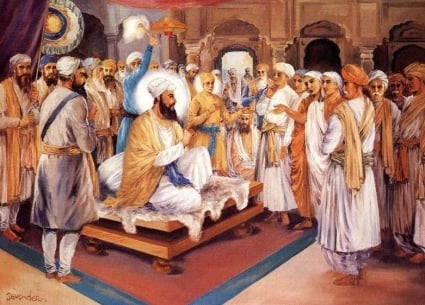
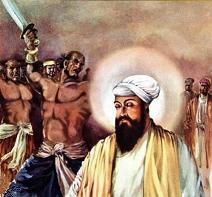
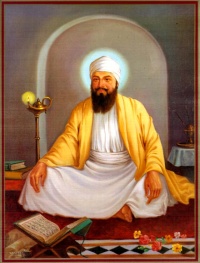
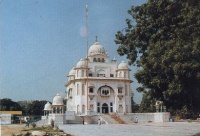
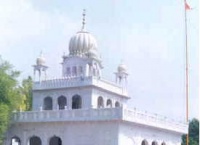
No comments:
Post a Comment